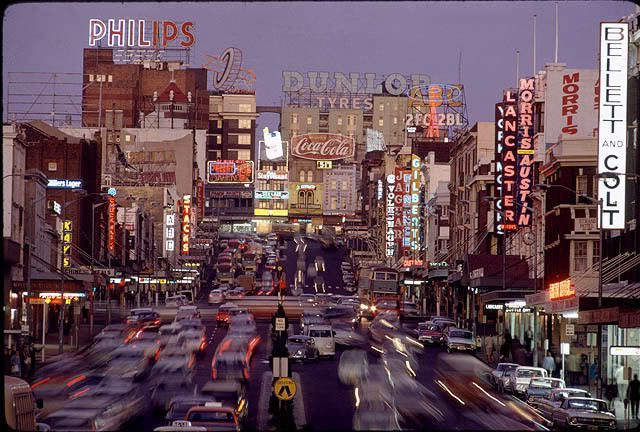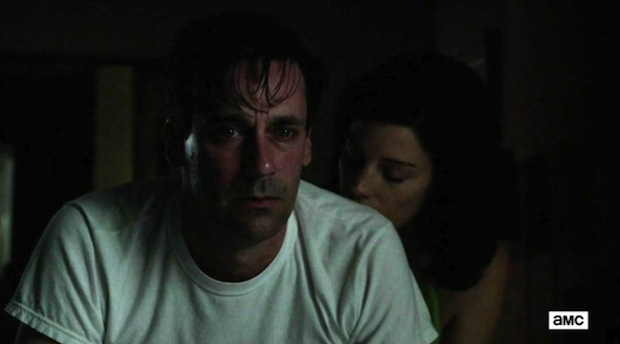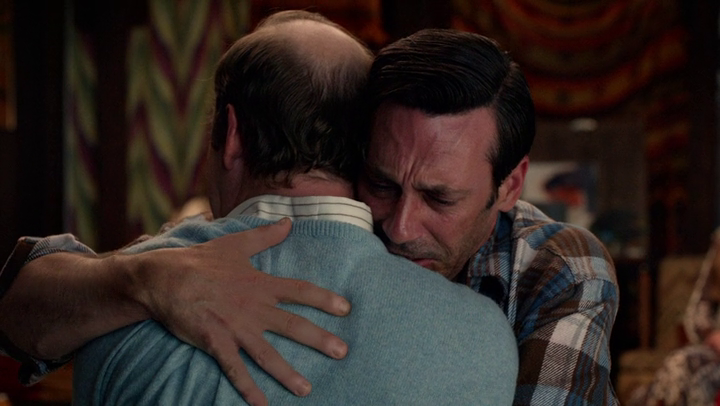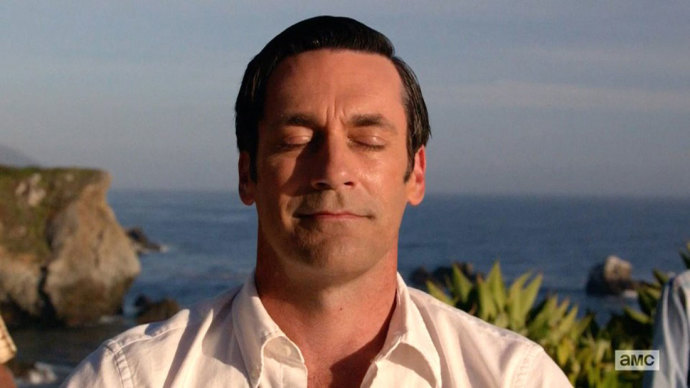The following article contains spoilers for the finale of Mad Men. If you haven’t seen it, go watch it now. We’ll wait.
If advertising is most effective when attempting to capture the cultural zeitgeist, the same could be said of Mad Men and its ruminations on the postmodern era. Watching the antics of Sterling Cooper was like watching the sixties – one of the most socially and historically significant decades of modern history – unfold through the prism of commercial and capitalist venture.
This was a program that dealt, through its own unique perspective, with the social upheaval following the Second World War. Racial tensions, simmering for decades, had reached their boiling point; women all over the world were pushing to gain further agency in their homes and the workplace; and the tenets of religion were slowly being overcome by a multitude of generations, both young and old, as they searched for meaning beyond what the dogmatic nature of scripture could provide.
In the place of religion, a new social construct was being offered to the masses: consumerism. The purchase of paradise through material goods. If commercialism was a new religion, preached to the burgeoning middle class, then the advertising agencies of Manhattan were the heralds, answerable only to the gods themselves – capitalist corporations.
Cynical? Perhaps. It all depends on your perspective.
Over the span of seven seasons, we watched as Sterling Cooper tapped into the zeitgeist of their era. They ignored the perils of smoking with a blissful ignorance to promote cigarettes, sold international hotel locations as missions for the American empire, and used the warmth of nostalgia in an uncertain time as a means of creating a bond with a product. Sterling Cooper manipulated the needs and perceptions of people to sell the one thing consumers craved above all else – happiness.
And few ad men sold the illusion of happiness like Don Draper.
Draper was initially a mystery to his peers and the audience at large. He was the epitome of masculine charm: a man forever with scotch in hand, cigarette between his lips and a wandering eye towards whatever woman would become his latest conquest. He inspired awe and envy in equal measure. Viewers were instinctively drawn to this flawed-yet-brilliant man with a compulsion greater than any of his mistresses. Being with him made us happy.
“Advertising is based on one thing, happiness. And you know what happiness is? Happiness is the smell of a new car. It’s freedom from fear. It’s a billboard on the side of the road that screams reassurance that whatever you are doing is okay. You are okay.”
– Don Draper.
Until it didn’t. Over the course of the series our happiness faded. We saw the man, the real man, behind the suit and pomade. And, like the women he once enthralled, he came to disgust us. Don represented the worst aspects of his craft: the insincere lure of temptation with nothing genuine to support it. He was a fraud, in more ways than one. And nobody knew that better than Draper himself.
This was a man more comfortable in the presence of strangers than with the people who truly loved him. Once a person got to know Don, he didn’t want them in his life. He rejected person after person, only interested in those he couldn’t persuade because at the most rotten core, that is what advertising does. It only exists to coerce people who are not already sold.
But like all advertisements when played on repeat, the appeal wore off. Don could never maintain the façade we were all so enamoured with initially. This was a man trapped by the power of nostalgia, one who could never escape his past, despite everything wonderful he held in his life.
If Don was a representation of advertising at its worst, the defunct product he was advertising was himself: one altered with a name change and an expensive coat of paint, the original defects held entirely in tact. More than once, the former Dick Whitman espoused how easy it was to move on, to forget the past. But he never could truly buy into what he was selling. Don may have manufactured happiness, but the genuine article? That was beyond him.
Or so it seemed. There was a great deal of speculation as to how the tale of Don Draper would end. The most cynical theory was that Don would turn out to be D.B. Cooper, an epithet for the unidentified man who hijacked a Boeing 747 in November of 1971. It made a certain kind of perverse sense: would a man who has desperately tried to escape the confines of his false life take such a drastic measure to reinvent himself again?
It was an outlandish theory that would never pan out. Instead of doubling down on inauthenticity, series creator Matthew Weiner opted for a purer form of closure: redemption.
Whisked away to a hippie commune in California, Don has reached the very end of his tether. He has been on a journey of oblivion, drinking and whoring his way through Middle America. But as he sits and listens to Leonard – a quiet, socially invisible man who dreams of being left on the shelf of a refrigerator, forever unchosen – Don finds release. He embraces Leonard as they both weep, overwhelmed by the notion that they aren’t the only people invisible to the joys of the word – the only ones incapable of finding happiness.
The final scene of Mad Men is a far cry from a disillusioned loner hijacking a plane. Don, his troubles seemingly unburdened, sits with a group of commune members as a guru instructs them in the ways of meditation. “A new day, new ideas… a new you,” the guru imparts to his followers, as we watch Don chant in low tongues and relax into his meditation. A serene, inspired smile slowly stretches across his face. Somewhere in the distance, a chime goes off. Don has never looked more content as we fade into… the iconic 1971 Hilltop commercial for Coca-Cola.
https://vimeo.com/126861514
There’s an argument to be made that this particular ending was no more or less cynical than any other theory: an indictment of the capitalist machine, the continued perversion of something pure for commercial gain. And yet, such an argument doesn’t ring true with creator Matthew Weiner:
“I felt like that ad in particular is so much of its time, so beautiful, and I don’t think it’s as villainous as the snark of today thinks it is.”
Draper’s entire life motivation was the pursuit of happiness, personal and professional. He believed advertising offered something he wished for more than anything: to be made whole. Finally, after decades of struggling to find the contentment he sold for decades through his work, Don – Dick – found happiness in the unlikeliest of places. And, having embraced that sense of self, he wanted to share that purity with the world – the only way he knew how.
It’s a rationale shared by Jon Hamm, the actor who played Don Draper for seven years:
“My take is that, the next day, he wakes up in this beautiful place, and has this serene moment of understanding, and realizes who he is. And who he is, is an advertising man.”
The Coca-Cola commercial is more than a jingle designed to sell soft drink. It’s considered by many to be the greatest commercial of all time because it offers something even the best modern advertisements lack: sincerity. It came at a time when the growing pains of the 1960s were giving way to something infinitely more hopeful.
Consider that only five years prior to the making of this ad, black and white people could not be seen on screen together. Now, members of every race had come together and given tope to the fact that peace on Earth was a real, tangible idea. They just happened to be holding Coke bottles while they did it.
It’s easy to celebrate cynicism in the modern age. Advertisements rarely evoke emotions the way the Hilltop commercial did over 40 years ago: few things do. And perhaps advertising has played a major role within the expanding disillusionment of contemporary society.
Even the most celebrated shows in our golden age of television embrace this cynical perspective, holding a mirror to society in the way all great fiction does. Breaking Bad, House of Cards, The Wire…
But Mad Men subverted every expectation and chose a different path. It offered its protagonist the chance of redemption, not destruction. And despite what the cynics believe, Don Draper took that chance and gave the world something beautiful. It was an earnest offering that tapped into something both Don and the world at large were ready to embrace: hope.
In every sense, that advertisement, that ending, was the real thing. Any cynicism implied comes only from us, not from the finale of Mad Men.
Your opinion on the finale of Mad Men may differ from ours: and hey, that’s the beauty of ambiguity. But there’s no ambiguity in the fact that Donald Draper could rock the hell out of a sharp suit and striped tie. For your viewing pleasure, here is a sample of the best this Mad Man had to offer. If men still dressed like this, the world would be a better place. Or at the very least, a better-dressed place.
Season One
Season Two
Season Three
Season Four
Season Five
Season Six
Season Seven
Photo Credits: AMC

















































































